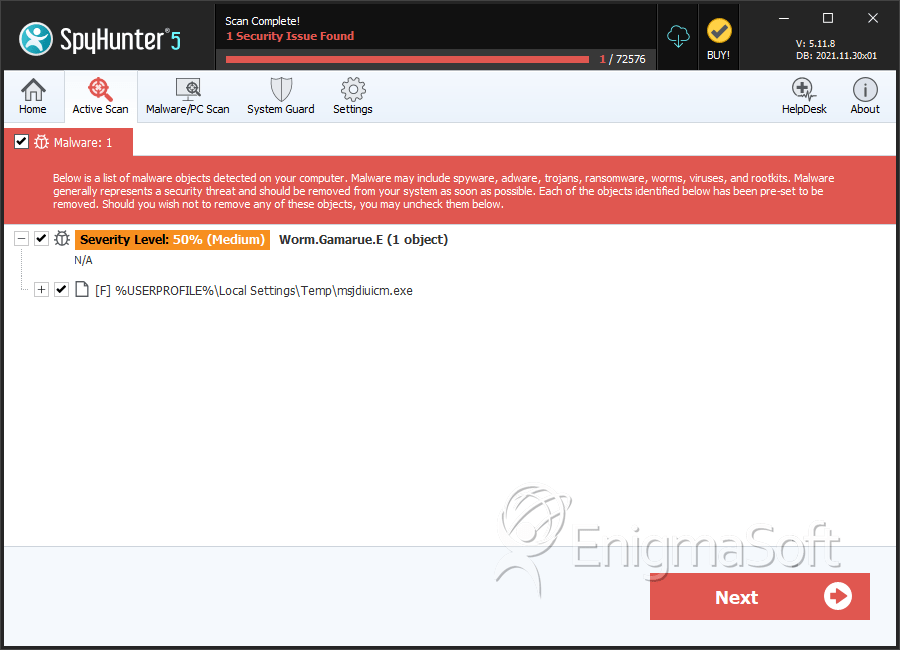Trojan.Gamarue.E
Threat Scorecard
EnigmaSoft Threat Scorecard
EnigmaSoft Threat Scorecards are assessment reports for different malware threats which have been collected and analyzed by our research team. EnigmaSoft Threat Scorecards evaluate and rank threats using several metrics including real-world and potential risk factors, trends, frequency, prevalence, and persistence. EnigmaSoft Threat Scorecards are updated regularly based on our research data and metrics and are useful for a wide range of computer users, from end users seeking solutions to remove malware from their systems to security experts analyzing threats.
EnigmaSoft Threat Scorecards display a variety of useful information, including:
Ranking: The ranking of a particular threat in EnigmaSoft’s Threat Database.
Severity Level: The determined severity level of an object, represented numerically, based on our risk modeling process and research, as explained in our Threat Assessment Criteria.
Infected Computers: The number of confirmed and suspected cases of a particular threat detected on infected computers as reported by SpyHunter.
See also Threat Assessment Criteria.
| Threat Level: | 50 % (Medium) |
| Infected Computers: | 3 |
| First Seen: | January 23, 2012 |
| OS(es) Affected: | Windows |
Trojan.Gamarue.E is a Trojan that is involved in an online scam related to Vodafone. Trojan.Gamarue.E is a malicious component of a Vodafone spam email malware campaign. The unsolicited email spreading Trojan.Gamarue.E is allegedly sent by Vodafone and affects Dutch web users, mainly computers located in Netherlands. Trojan.Gamarue.E can collect confidential information from affected computer users while transferring it onto a distant server monitored by scammers. The fake Vodafone email message poses as an MMS (Multimedia Messaging Service) attachment that is supposedly archived by Vodafone. The junk Vodafone email, partially including a text written in English, informs the victim that there's an image file attached which is from a specific 'XXX' cell-phone number. The deceptive Vodafone email message is generated using specific obfuscation techniques so that it may bypass the detection by spam filters. The fraudulent Vodafone email fools recipients into opening the malevolent attachment which, if opened, surreptitiously downloads and installs Trojan.Gamarue.E on the computer by corrupting the PC. Trojan.Gamarue.E may also drop and execute random files after installing itself on the targeted computer system. Trojan.Gamarue.E is able to proliferate onto detachable drives such as Universal Serial Bus (USB).
Table of Contents
Aliases
7 security vendors flagged this file as malicious.
| Anti-Virus Software | Detection |
|---|---|
| Panda | Suspicious file |
| AVG | Win32/Cryptor |
| Fortinet | W32/Yakes.B!tr |
| Microsoft | Worm:Win32/Gamarue.E |
| Comodo | TrojWare.Win32.Trojan.Agent.Gen |
| Kaspersky | HEUR:Trojan.Win32.Generic |
| NOD32 | a variant of Win32/Kryptik.ZDT |
SpyHunter Detects & Remove Trojan.Gamarue.E

File System Details
| # | File Name | MD5 |
Detections
Detections: The number of confirmed and suspected cases of a particular threat detected on
infected computers as reported by SpyHunter.
|
|---|---|---|---|
| 1. | msjdiuicm.exe | 74f76bdb5eb63809e1af2a5c9b830962 | 3 |


Submit Comment
Please DO NOT use this comment system for support or billing questions. For SpyHunter technical support requests, please contact our technical support team directly by opening a customer support ticket via your SpyHunter. For billing issues, please refer to our "Billing Questions or Problems?" page. For general inquiries (complaints, legal, press, marketing, copyright), visit our "Inquiries and Feedback" page.